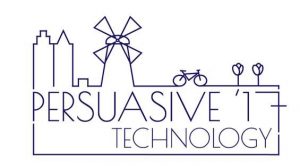

The conference is hosted by the Persuasive Health Technology Lab, part of the Centre for eHealth & Wellbeing (www.cewr.nl) at the University of Twente, the Netherlands.
University of Twente
High Tech Human Touch: That’s what the University of Twente stands for. It is an entrepreneurial University that is noted for:
– Excellent education & research
– New technology as motor for change, innovation and progress
– Combination of technology & social sciences
– Entrepreneurial attitude
The University of Twente sets standards in the field of new technology and seeks to stimulate change, renewal and progress in society. Our strength lies in our capacity to combine. We work with the technologies of the future – e.g. information technology, biotechnology and nanotechnology – in which behavioral and social science research play a vital role. After all, the most interesting and relevant innovation takes place at the interface between technology and its implications for mankind and society. We are active in areas such as health, water, green energy, security, and education, building bridges between the different fields of science.
The Centre for eHealth & Wellbeing
The Centre for eHealth & Wellbeing Research is a leading research centre for personalized and persuasive health care, improving health and resilience of individuals and communities by user-friendly, persuasive and personalized smart self-management technologies. The Centre’s mission is to improve health and wellbeing of individuals and communities by user-friendly, meaningful, persuasive and adaptive technologies.
The Centre creates synergy in health and wellbeing research through the combination of 4 research labs: Persuasive Health Technology, Positive Psychology and Technology, Story Lab, and Self-Management and Health Assessment. The Persuasive Health Technology lab will be the one hosting the conference.
The Centre’s cooperation with science, governance, industrial and healthcare partners underlines its theoretical driven and implementation oriented approach. We cooperate with different partners, such as: the International Academy, Research, and Industry Association; the National Institutes of Health Informatics (Canada); Medicinfo; the University of Oulu (Finland); e-Vita; e-Hulp; the National Institute for Public Health and the Environment (the Netherlands); EurSafety Health-Net; Karify – connecting care; the Centre for Global eHealth Innovation; the University Medical Center Groningen (the Netherlands); the University Hospital Muenster (Germany); Minddistrict; and the University of Waterloo (Canada).
The Persuasive Health Technology Lab
The Persuasive Health Technology Lab enables personalized healthcare via empathic, user-adaptive technologies. Technologies that have value for all stakeholders and that are implementable in society. We do so by applying a holistic and participatory approach for eHealth development. Holistic, because we focus on needs and values of users and stakeholders during the entire process of development, from initiation to evaluation, to ensure technology fits with daily routines and practices. Participatory, because users and stakeholders are involved in every phase of development, to evaluate the concepts of technology and to co-create a business model for implementation.
In our view, technology can be seen as a human character: it can engage and create deep affective relationships, thereby improving adherence. And when technology is persuasive and pleasant to use, it has greater potential to be adopted and integrated in daily life.
In co-creation with users, persuasive prototypes are designed. Via real time evaluations methods we investigate how to personalize technology and what kinds of persuasive triggers can improve engagement, affection and adherence. We transform healthcare via personalized and persuasive behavioral change support systems and we develop and implement unobtrusive and engaging technologies that fit the users in their contexts.
Technology in our view is not a tool, but an infrastructure for change. Changing the way of thinking about how to improve, for instance, healthcare with technology. We have multidisciplinairy based international programs to develop technologies that matter; connecting science, business and healthcare.